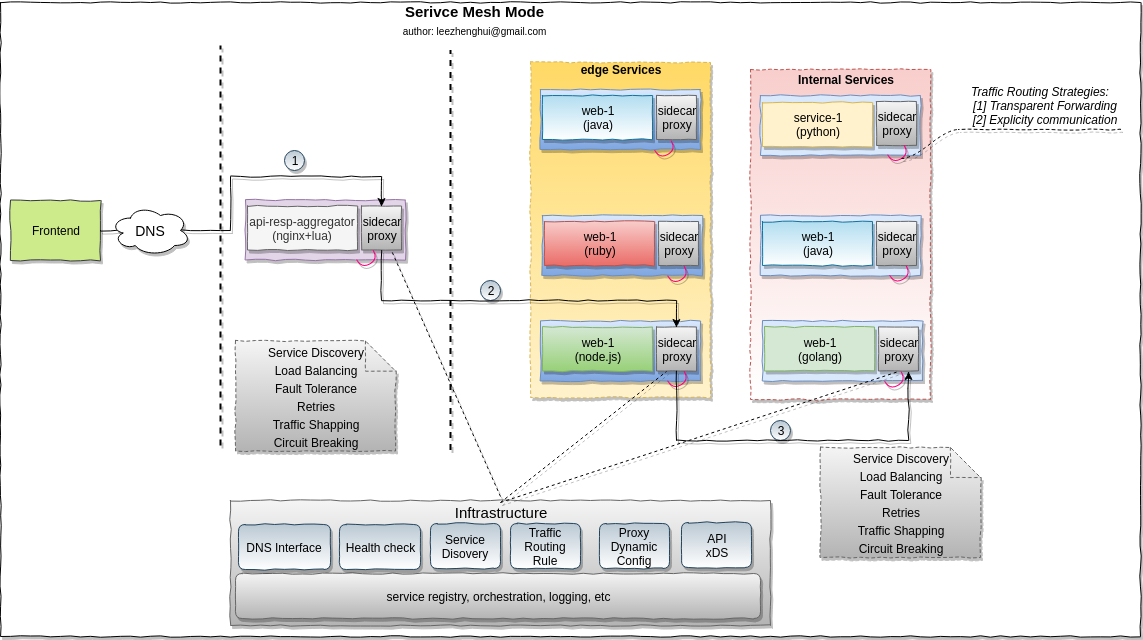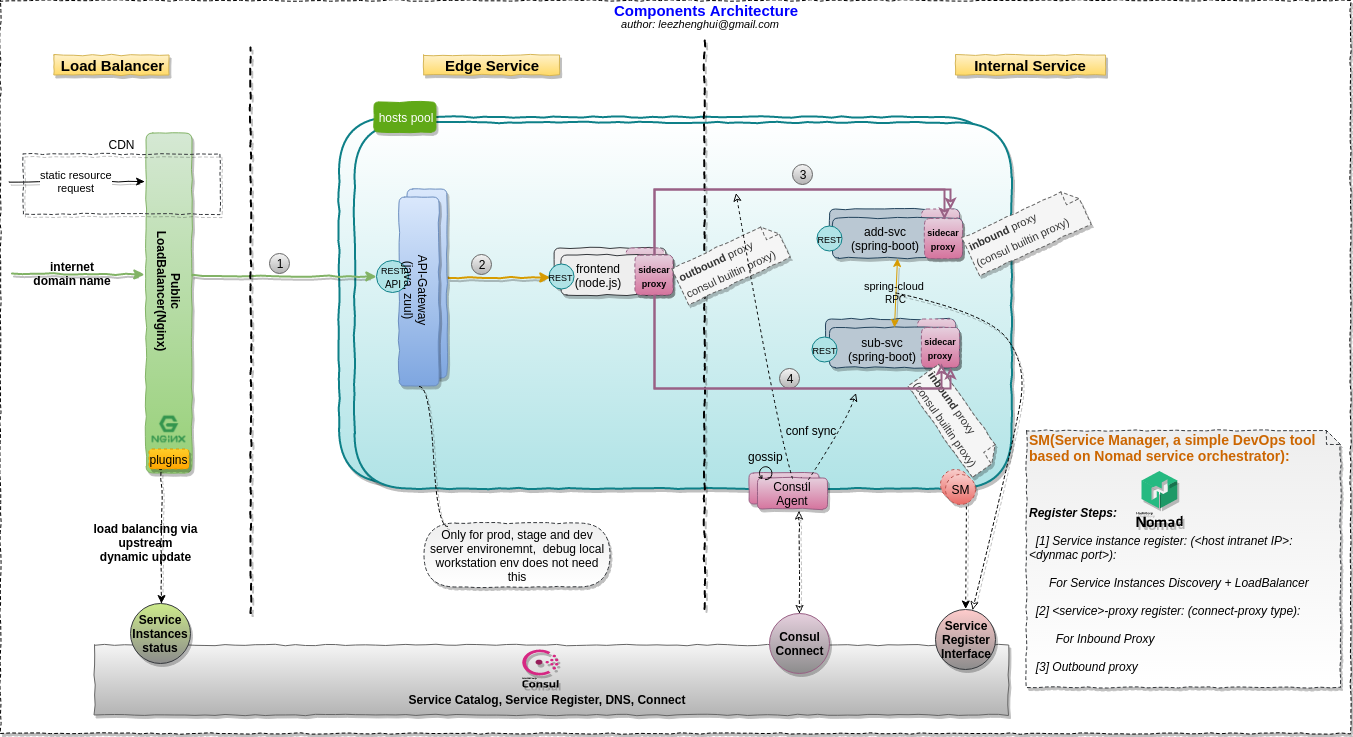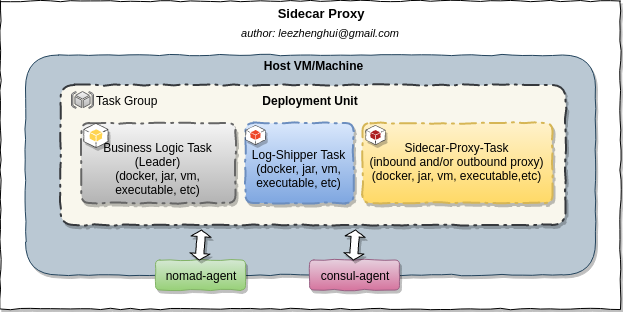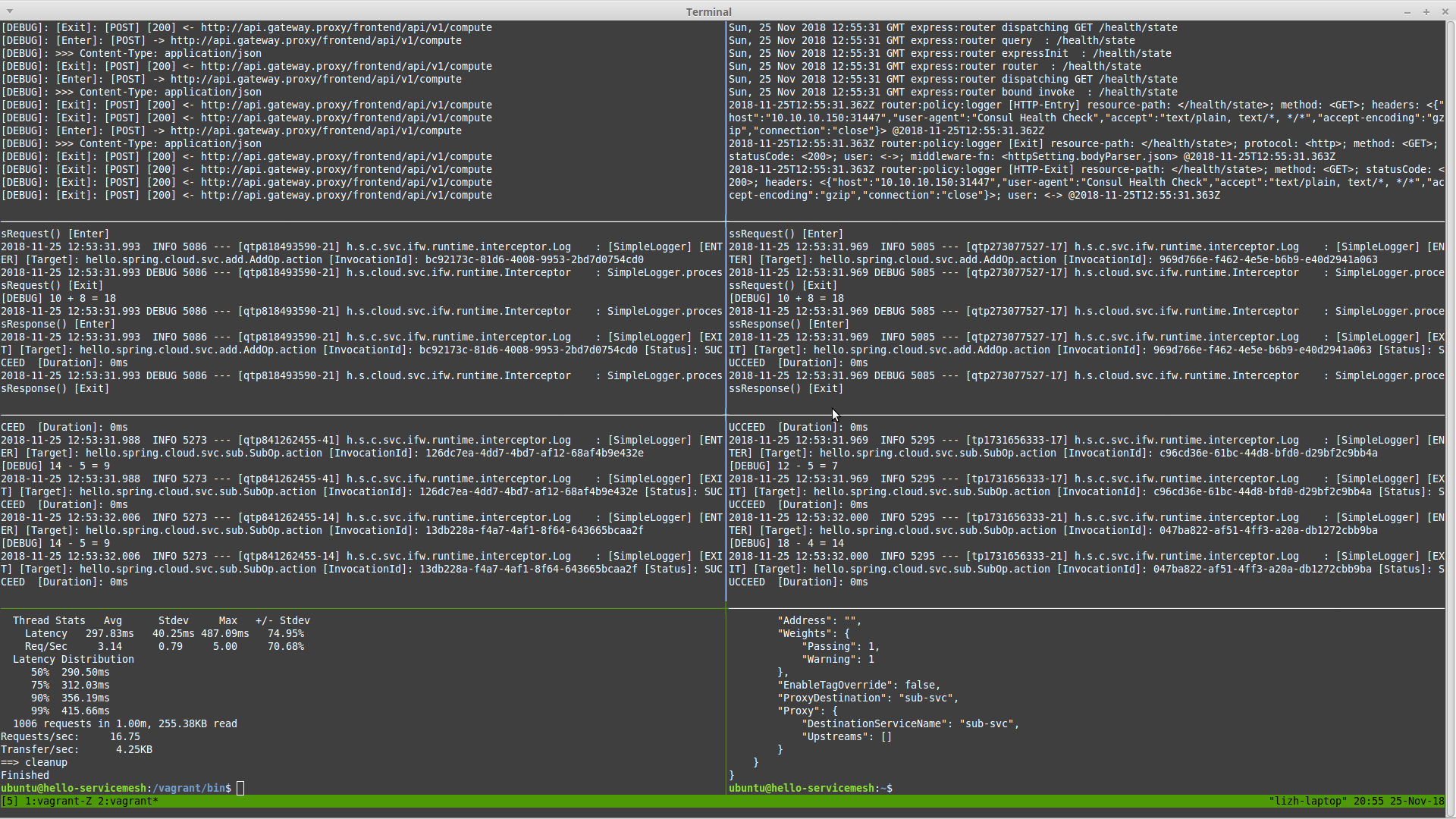Build a Modern Scalable System - Practice on Service Mesh Mode with Consul and Nomad
This article is Part 5 in a 7-Part Series.
- Part 1 - Build a Modern Scalable System - Basics
- Part 2 - Build a Modern Scalable System - Runtime Challenges
- Part 3 - Build a Modern Scalable System - Practice on Embedded Router Mode w/ Spring-Cloud
- Part 4 - Build a Modern Scalable System - Practice on Gateway Mode For Mixed-Languages Case
- Part 5 - This Article
- Part 6 - Build a Modern Scalable System - Practice on Service Mesh Mode with Consul, Nomad and Envoy
- Part 7 - Build a Modern Scalable System - Presentation of Runtime and Data Layers Challenges(in Chinese)
Table of Contents
In last post, I introduced the gateway mode via a PoC sample containing java and node.js services. This post will focus on the PoC sample for service mesh mode, which can provide a solution for a mixed languages development challenges in MSA.
All of the sample source code is hosted on repsoitry, it is automated, and easy to run. To simplify the sample content, I just keep the service-mesh related features in it, if you are interested in aggregated logging, performance analysis, please refer to earlier posts.
Recall the service mesh mode

Please refer to my early post reference-modes-for-msa-service-communication for more details about the MSA runtime challenges.
PoC sample
Scenario overview

Sidecar Tasks

The sample is based on
consul connectand it's builtin proxy for the serviemesh. We want to use it to demonsrate the service mesh concepts for a hybrid environments(docker is not the only packing method, mixed deployable types for the service orchestration which could not be achieved by k8s only. cloud-native and on-premise co-exists). Please note, Consule connect was introduced in Consul 1.2 and be marked as beta quality for now, thus, not ready to be used in a production environment.
Soruce code structure
Modules
├── modules
│ ├── add.svc // add operator service, which will be called by calculator-ui
│ │ ├── build.gradle
│ │ ├── out
│ │ └── src
│ ├── api.gateway // api.gateway based on Zuul
│ │ ├── build.gradle
│ │ ├── out
│ │ └── src
│ ├── frontend // front-end service(edge service), which is implemeted by node.js, will call to add.svc and sub.svc
│ │ ├── build.gradle
│ │ ├── out
│ │ └── src
│ ├── ifw.lib // A prototype simple library impl to demonstrate an AOP based invocation framework with annotated QoS supports (just for demo only, not a production quality)
│ │ ├── build.gradle
│ │ ├── out
│ │ └── src
│ ├── sub.svc // subtract operator service, which will be called by calculator-ui
│ │ ├── build.gradle
│ │ ├── out
│ │ └── src
Operational source code
ops
├── Vagrantfile // Vagrant file
├── ansible // ansible scripts for install and start services, including: commoent runtime dependences, zookeeper, kafka, nginx(for local pkgs repo), install JVM, filebeat, consul, nomad, elasticsearch, logstash, kibana and wrk
├── bin // script, including boostrap.sh, click.sh(fire an invocation on the sample), kafka-*-monitor.sh, start_all_jobs.sh and stop_all_jobs.sh
├── deployable // nomad job definition files(hcl) for microservices
├── deps // binary dependences, which cache it locally to reduce(avoid) network deps during demonstration
├── dist // pkgs publish folder, nginx is started on this folder to simulate a pkg repository
Run the Sample
All of service instances are using dynamic ports in this sample to demonstrate the auto-scale features.
As we want to focus on servicemesh part in the sample, to make the verification(for service discovery and load balancing) ealier, only the internal services are scheduled multiple instances in this sample. If you are interested in the edge services, please refer to hello-msaproxy for details.
Steps
- Prerequisites
- Java
- Node.js
- Gradle
-
Git clone the project
On host:
git clone git@github.com:leezhenghui/hello-servicemesh.git -
Gradle build/deploy distribution
On host:
cd hello-servicemesh/modules/frontend npm install cd ../../ gradle deploy -
Launch VM
On host:
cd ops vagrant up -
Provision the VM
On host:
vagrant provision -
Start all nomad jobs
For each services, two intances will be created for a load balance, service discovery testing
On host:
vagrant sshIn VM
cd /vagrant/bin ./start_all_jobs.shAfter start all jobs, we can see 4 connect-proxy(inbound side proxy) instances created:
root 4222 4180 0 14:25 ? 00:00:00 /opt/consul/bin/consul connect proxy -service add-svc -service-addr 10.10.10.150:22130 -listen :28489 -register -register-id 28489 root 4223 4171 0 14:25 ? 00:00:00 /opt/consul/bin/consul connect proxy -service add-svc -service-addr 10.10.10.150:24291 -listen :26604 -register -register-id 26604 root 4273 4203 0 14:25 ? 00:00:00 /opt/consul/bin/consul connect proxy -service sub-svc -service-addr 10.10.10.150:23454 -listen :26351 -register -register-id 26351 root 4275 4207 0 14:25 ? 00:00:00 /opt/consul/bin/consul connect proxy -service sub-svc -service-addr 10.10.10.150:25384 -listen :28277 -register -register-id 28277as well as two upstream-proxy(outbound side proxy) instances:
root 4304 4259 0 14:25 ? 00:00:00 /opt/consul/bin/consul connect proxy -service frontend -upstream sub-svc:28153 root 4322 4260 0 14:25 ? 00:00:00 /opt/consul/bin/consul connect proxy -service frontend -upstream add-svc:28663 -
Run the sample
In VM:
./click.sh -
Run benchmark
In VM:
./benchmark.sh
Result of Service Discovery and Load Balance

Wrapping up
In this post, we introduce the service mesh mode via PoC sample, in next post, we will take a hands-on practice on service mesh mode with envoy proxy for a mixed programming language scenario.
This article is Part 5 in a 7-Part Series.
- Part 1 - Build a Modern Scalable System - Basics
- Part 2 - Build a Modern Scalable System - Runtime Challenges
- Part 3 - Build a Modern Scalable System - Practice on Embedded Router Mode w/ Spring-Cloud
- Part 4 - Build a Modern Scalable System - Practice on Gateway Mode For Mixed-Languages Case
- Part 5 - This Article
- Part 6 - Build a Modern Scalable System - Practice on Service Mesh Mode with Consul, Nomad and Envoy
- Part 7 - Build a Modern Scalable System - Presentation of Runtime and Data Layers Challenges(in Chinese)